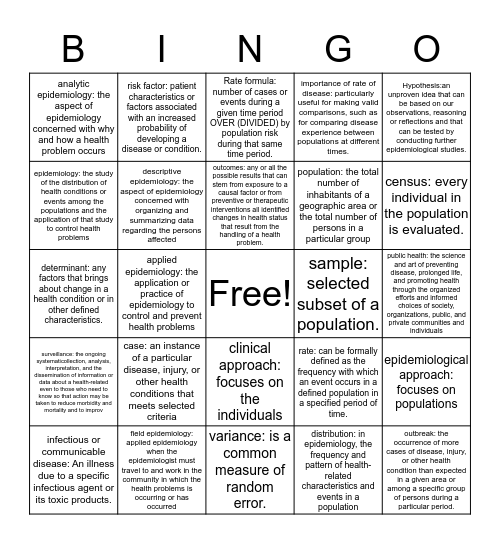

This bingo card has a free space and 24 words: case: an instance of a particular disease, injury, or other health conditions that meets selected criteria, field epidemiology: applied epidemiology when the epidemiologist must travel to and work in the community in which the health problems is occurring or has occurred, outcomes: any or all the possible results that can stem from exposure to a causal factor or from preventive or therapeutic interventions all identified changes in health status that result from the handling of a health problem., infectious or communicable disease: An illness due to a specific infectious agent or its toxic products., Hypothesis:an unproven idea that can be based on our observations, reasoning or reflections and that can be tested by conducting further epidemiological studies., analytic epidemiology: the aspect of epidemiology concerned with why and how a health problem occurs, epidemiology: the study of the distribution of health conditions or events among the populations and the application of that study to control health problems, risk factor: patient characteristics or factors associated with an increased probability of developing a disease or condition., sample: selected subset of a population., clinical approach: focuses on the individuals, population: the total number of inhabitants of a geographic area or the total number of persons in a particular group, determinant: any factors that brings about change in a health condition or in other defined characteristics., rate: can be formally defined as the frequency with which an event occurs in a defined population in a specified period of time., epidemiological approach: focuses on populations, descriptive epidemiology: the aspect of epidemiology concerned with organizing and summarizing data regarding the persons affected, distribution: in epidemiology, the frequency and pattern of health-related characteristics and events in a population, public health: the science and art of preventing disease, prolonged life, and promoting health through the organized efforts and informed choices of society, organizations, public, and private communities and individuals, Rate formula: number of cases or events during a given time period OVER (DIVIDED) by population risk during that same time period., census: every individual in the population is evaluated., applied epidemiology: the application or practice of epidemiology to control and prevent health problems, outbreak: the occurrence of more cases of disease, injury, or other health condition than expected in a given area or among a specific group of persons during a particular period., surveillance: the ongoing systematicollection, analysis, interpretation, and the dissemination of information or data about a health-related even to those who need to know so that action may be taken to reduce morbidity and mortality and to improv, importance of rate of disease: particularly useful for making valid comparisons, such as for comparing disease experience between populations at different times. and variance: is a common measure of random error..
Introduction to Epidemiology Vocab | Disease Occurrence, Distribution, and Pattern VOCAB BINGO | Epidemiology | Epidemiology | Infectious Disease!!
Share this URL with your players:
For more control of your online game, create a clone of this card first.
Learn how to conduct a bingo game.
With players vying for a you'll have to call about __ items before someone wins. There's a __% chance that a lucky player would win after calling __ items.
Tip: If you want your game to last longer (on average), add more unique words/images to it.